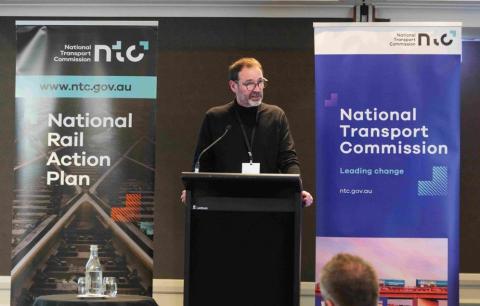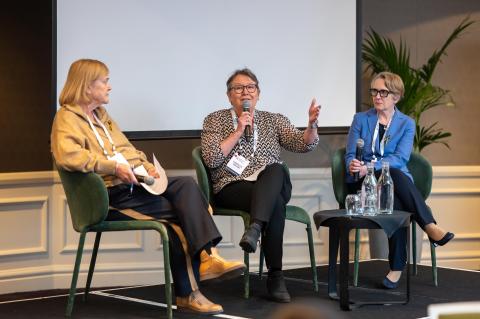Future Rail Skills Forum
July was a busy month for NRAP including our second Future Rail Skills Forum in Sydney last week. The forum sent a clear message that stronger national collaboration is essential to developing the skilled, mobile workforce Australia needs as we transition to a safer, more productive digital rail network.
The event brought together local and international experts who shared insights into how technology and new approaches to training and curriculum development are helping to build rail’s future workforce
It was noted that rail could be 30% more productive than today if it invests in its people and skills capability for the digital age. To achieve this, speakers stressed the importance of having an adaptable, national workforce, and the need for greater partnerships between governments, industry and education.
Angela Di Febbraro, who leads the European Rail Skills Alliance (STAFFER), announced that Europe has recently approved an additional four years of funding to establish a transnational education framework across the Single European Railway Area. The funding will also support initiatives to attract a more diverse cohort of workers to the rail sector.
The Forum emphasised the pace of change in the industry, with digital skills, change management and data analytics now seen as critical capabilities for the future.
Presentations noted the importance of:
- Standardising data across the industry
- Promoting rail as a green industry to attract a more diverse cohort
- Strengthening links with VET and higher education
- Making training more accessible and appealing to younger workers.
A national pathway to digital signalling
A digital rail system is more productive, safe, and sustainable, but how does Australia get there in an integrated and cost-effective way? This was the focus of this month’s Australasian Railway Association (ARA) panel on Modernising Australia’s Rail Infrastructure: The role of European Train Control System (ETCS) and the Future Railway Mobile Communication System (FRMCS).
Our Executive Leader, National Rail Reform, Sandra McKay (GAICD) joined international and Australian rail leaders to share insights on transitioning to modern signalling and communications systems.
Sandra provided an update on Australia’s national policy direction for aligning rail technology and led a panel with signalling experts from Europe and Australia, exploring the need for national consistency, the benefits of adopting global standards and coordinating next-generation 5G technologies, and the importance of ensuring regional freight viability in regional and rural areas.
Taking a nationally coordinated approach to digital signalling is critical if Australia is to have a well-planned, efficient transition to a modern rail network - unlocking billions of dollars in productivity, safety and environmental gains, while giving industry greater confidence to invest.
You can read more about the ARA panel event here.
Alex McGrath - our new Senior Advisor for Rail Technologies
We’re excited to welcome Alex McGrath, the NTC’s new Senior Advisor Rail Technologies to help advance the delivery of the National Rail Action Plan.
Alex jumped straight into her new role during the Australasian Railway Association’s People and Culture Conference this week where she hosted a panel of experts on the European Train Control System (ETCS) to discuss the training needs for the rollout of ETCS signalling and advanced train control technologies.
The panel including John Holland Group’s Signalling Commissioning Manager, Brendan Howell, and Sigtech Solutions’ Test & Commissioning Manager – Rail Signalling, Jesse Crick.
Brendan and Jesse noted the enthusiasm for upskilling among workers but also pointed out that conventional signalling skills will remain essential for decades to come.
Alex has been seconded to the NTC from V/Line where she was Engineering Manager Operational Control Systems & Data Networks. She brings with her two decades of experience working across governments and industry in digital rail control, signalling and communications systems.
You can read more about Alex’s panel discussion and other NTC presentations at the conference here.
Building a seamless national rail system
The Rail Industry Safety and Standards Board (RISSB) plays a critical role in making rail more productive by aligning standards and processes. In July they signalled their ongoing commitment to achieving a more streamlined rail system, becoming the latest signatory to our Memorandum of Cooperation for Interoperability.
The memorandum has been signed by all governments along with network managers, operators, and suppliers who agree that improving rail productivity and safety through interoperability requires a united effort.
Rail interoperability is a key focus of the National Rail Action Plan. Together with industry, we’re delivering Australia’s first mandatory interoperability standards, aligning technology investments, and creating more consistent operations.
As we shift to a mandatory environment, governments and industry bodies will take on new responsibilities to help realise a truly seamless national rail network.
You can read more about it here.
Find out more about the National Rail Action Plan.
Harmonising rules for a safer, more productive rail system
Australia’s producers need to respond quickly to capitalise on shifting global prices. While rail is often their preferred transport option, a lack of harmonisation across rail networks can obstruct operators’ ability to deploy rapidly.
The NTC is working with industry to remove these barriers by reducing differences across our rail system and developing a national set of operating rules and practices for use across the network.
More consistent rules will mean less need for bespoke training and better recognition of workers’ skills. Making it easier for rail workers to move between networks.
Having nationally recognised rules will also improve safety, lift productivity, and reduce training costs.
You can read more about our national network rules project here.

